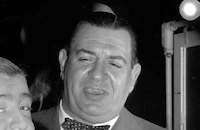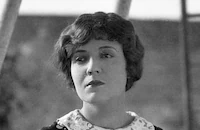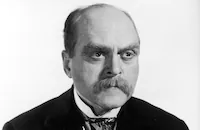The Show-Off

Brief Synopsis
Cast & Crew
Charles F. Riesner
Spencer Tracy
Madge Evans
Henry Wadsworth
Lois Wilson
Grant Mitchell
Film Details
Technical Specs

Synopsis
While sailing on an excursion boat, J. Aubrey Piper, a clerk at the Mid-Atlantic Railroad Company, saves a drunken passenger from drowning and impresses pretty Amy Fisher with his bravery. After the rescue, Aubrey overhears Amy tell the police the address of her father's Newark, New Jersey realty company, and later shows up there, posing as a wealthy, would-be home buyer. Although her no-nonsense parents take an immediate dislike to the loquacious braggart, who makes a practice of test driving new automobiles he has no means to buy, Amy quickly falls in love with him and accepts his proposal. After a modest wedding and honeymoon, Aubrey and Amy settle into their own apartment, which Aubrey, out of impestuous love for Amy, fills with luxury items they cannot afford. Eventually Aubrey's debt leads to the attachment of his salary and, out of desperation, Amy announces that she is returning to work. Amy then tells her stunned husband that they must move in with her parents until they have paid their debts. When Aubrey's initial anger passes, he realizes the wisdom of Amy's actions and vows to change his extravagant, thoughtless ways. For his first act as a "new man," Aubrey, whose laziness and irresponsibility have kept him from rising at the railroad company, goes to work early and impresses his office manager with his concentrated efforts. However, Aubrey falls into trouble with J. B. Preston, the railroad president when he corners Andrew Barnabas, a farmer whose land the railway is interested in buying, and, on his own authority, promises to purchase 900 more acres than the railroad needs. After an infuriated Preston fires him, Aubrey heads for an automobile dealership to test drive a new car. When he returns to his in-laws' home that night, Aubrey confesses to Amy and her parents that, not only was he fired, but was involved in a costly automobile accident as well. Undone, Amy tells her husband that she is separating from him until he "becomes a man" and makes good on his pledge to change. A sobered Aubrey then searches for work but secures only a temporary job as a sandwich board advertiser. While walking the street with his board, Aubrey runs into Amy's brother Joe, an aspiring young inventor. Joe tells Aubrey that he is on his way to a law firm to discuss a $5,000 offer for his new rust-preventing invention. Ever the know-it-all, Aubrey cannot resist the temptation to go to the law firm ahead of Joe and haggle with an attorney about the sale price of Joe's invention. After the lawyer dismisses Aubrey's demands that Joe be paid $100,000 and fifty percent of the invention's profits and angrily retracts his original offer, Aubrey returns home in shame. As Aubrey confesses his deed to Amy and her parents, however, Joe bursts in and announces that, because of the machinations of his "manager," the lawyer offered him $50,000 and twenty percent of the profits. Before his disapproving in-laws can absorb this unexpected development, Aubrey then receives a letter from Preston informing him that, because the land he forced the railroad company to buy turned out to be extremely profitable, he may return to the railway in a high-paying position. Fully vindicated, a wiser but still talkative Aubrey happily reunites with Amy.

Director

Charles F. Riesner
Cast

Spencer Tracy

Madge Evans

Henry Wadsworth

Lois Wilson

Grant Mitchell
Clara Blandick
Alan Edwards

Claude Gillingwater

Lee Phelps
Purnell B. Pratt
Dora Clemant
Charles Williams
Nick Copeland
Richard Tucker

Charles Levison
Sherry Hall
Ernie Alexander
Sidney Miller
Crew

Film Details
Technical Specs

Articles
The Show-Off (1934)
But take all those mental film clips of the steadfast icon and shove them to the back of your mind when you consider the younger Spencer Tracy in The Show-Off (1934). It wasn't long before he was to break out as a lynch mob victim in Fury (1936). Until then, however, he had been considered a critic's darling in such films as Frank Borzage's noteworthy Depression-era reverie, Man's Castle (1933). But, like Hepburn, he was regarded as box-office poison! It wasn't as if Tracy hadn't paid his professional dues. He began acting on stage in 1922, making his Broadway debut the following year as a robot with no spoken lines in R.U.R. In 1930 he and a prison play, The Last Mile, were Broadway hits. John Ford liked him in the play and cast him in his own prison movie, Up the River (1930). Tracy and Humphrey Bogart made their debuts in it and often spoke of working together again, but never did. Work at Fox from 1930-35, though, failed to boost Tracy onto the A-list. He made 25 films, most of them flops.
The most significant thing about The Show-Off may have been that he was lent to MGM to film it after Hollywood's other Tracy - Lee - was detoured by strong drink in Mexico. MGM's production chief, Irving Thalberg, saw something in Tracy that Fox didn't and urged studio boss Louis B. Mayer to sign Tracy. Mayer did, despite reservations connected to Tracy's reputation as another actor with a drinking problem. Tracy went to MGM in 1935, stayed until 1955, made the most of the better scripts available to him there, and rose to stardom. It would be idle to insist that The Show-Off was one of those scripts. But it deserves better than the disparagement it got from some writers. The comedy by George Kelly (Grace Kelly's uncle) was a Broadway hit in 1924, and had been filmed as a 1926 silent with super-siren-to-be Louise Brooks as the love interest, and again in 1946 with Red Skelton in the title role. One reaches for dated words to describe its protagonist, J. Aubrey Piper. Blowhard, gasbag and loudmouth spring to mind. He pipes up, always on his own behalf. He never pipes down.
Tracy's tricky assignment was to make us root for - or at least not root against - a character not immediately likable, if not an out-and-out jerk. He beats the odds, and gets the job done with two of his trademark tools - acting with his eyes, and listening hard. Like most good comic characters, Aubrey Piper never knows when enough is enough. A small cog in a big machine - a railroad - he keeps bragging, exaggerating, lying, and inflating his station, never able to stop his flow of whoppers until they do him in. Mistakenly taking him for a hero when he's pushed overboard and saves a drunk who falls off an excursion boat (a function of Herman J. Mankiewicz's crisp screen adaptation), he becomes the poisoned apple of Madge Evans's eye. Evans's Amy can't wait to bring him home to her parents and her go-getter inventor brother, and tie the knot. She projects warmth and appeal, and the way Tracy looks at her pays off later, when he's gone too far and one of his heedless acts costs him his job; she tells him she no longer can live with him. He then hangs his head, lingering around outside her parents' house, intercepts her brother (who remains friendly enough) and, leaving his bluster on the curb, asks the brother in a deflated way what she's doing and if she talks about him. This is the moment where Tracy finds some emotion to play.
It's not that he's contrite, or even feels bad about hurting someone who put her trust in him. He's just in pain, and lets it seep into his subdued manner, after losing the woman he loves. It's then that we buy that fact that he does love her. This is in contrast to her married sister, whose husband seems a much more solid prospect, but without ever saying so, we become aware that he cheats on her and that she puts up with it. His sister-in-law's husband may have business savvy, but Aubrey has heart. And it is fun to watch Tracy sail into Aubrey's bluster full tilt. No nonsense about the insecurities that drive him to behave as he does. We just get actions and their consequences here, and we enjoy Tracy as he labors to keep up Aubrey's front. His mother-in-law and to a lesser extent father-in-law grump about Aubrey's windy but empty mouthings, but Aubrey just laughs off their disparaging remarks with gusto and unruffled amiability, even when he gets Clara Blandick's dander up by calling her "Mumsy-Wumsy."
Kelly was something of a moralist as a playwright, but he has the good sense, or sure dramatic instinct, to fly in the face of conventional morality and give Aubrey a break - two breaks, really - in a pulled-out-of-a-hat ending that some have groused about as merely convenient. But a sudden undeserved upturn looks good on Tracy, whose carnation stays firmly planted in his buttonhole even when he falls into New York Harbor. There's also something satisfying about the script's flouting materialistic America's ideal of lip service to hard work, and acknowledging that some fortunes are indeed the result of dumb luck. Tracy keeps it simple in The Show-Off. Given its nature, how could he do otherwise? But his choices are always the right ones. You can imagine him, as Joseph L. Mankiewicz once described him, holing up in a room nights, alone with the script of Test Pilot (1938), paring, paring, working to achieve plainness, until he arrived at as little as he needed to make the role work. He was a minimalist who delivered to the max.
Producer: Lucien Hubbard
Director: Charles F. Reisner
Screenplay: Herman J. Mankiewicz; George Kelly (play)
Cinematography: James Wong Howe
Art Direction: David Townsend
Film Editing: William S. Gray
Cast: Spencer Tracy (J. Aubrey Piper), Madge Evans (Amy Fisher Piper), Henry Wadsworth (Joe Fisher), Lois Wilson (Clara Harling), Grant Mitchell (Mr. 'Pa'), Clara Blandick (Mrs. 'Ma'), Alan Edwards (Frank Harling), Claude Gillingwater (J.B. Preston).
BW-77m.
by Jay Carr

The Show-Off (1934)
Quotes
Trivia
The original play first opened on 5 February 1924 in New York.
The part of J. Aubrey Piper was originally to be played by Lee Tracy, but his contract was terminated by MGM when he insulted a Mexican cadet during the production of Viva Villa! (1934). Spencer Tracy (no relation to Lee) got the part with the help of Frank Morgan, and afterwards signed a long-term contract with MGM.
Notes
Although a print of this film was not viewed, the above credits and plot information were taken from a cutting continuity submitted with the copyright records. Hollywood Reporter production charts include Sterling Holloway in the cast, but his appearance in the final film has not been confirmed. After months of searching for a lead actor, M-G-M borrowed Spencer Tracy from Fox for this production. According to modern sources, Tracy was selected for the part after M-G-M's original choice, Lee Tracy (no relation), was fired from their production of Viva Villa! and was subsequently expelled from the studio. Modern sources contend that Spencer Tracy won the part with help from M-G-M contract star Frank Morgan. Tracy's work on the film impressed M-G-M executive Irving Thalberg and was, according to modern sources, instrumental in securing him a long-term contract at that prestigious studio.
For information on other films based on the George Kelly play, please consult the entry for the 1946 M-G-M production The Show-Off, directed by Harry Beaumont and starring Red Skelton and Marilyn Maxwell (see AFI Catalog of Feature Films, 1941-50).














